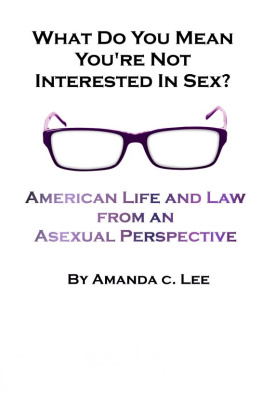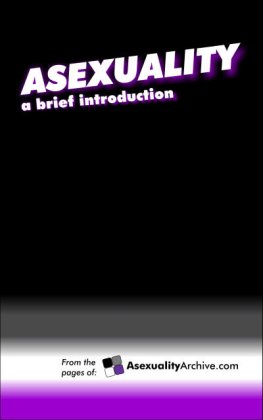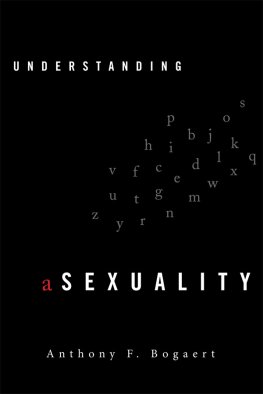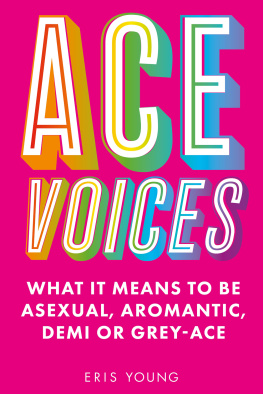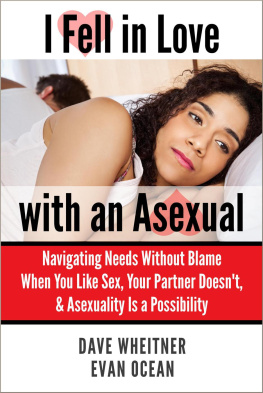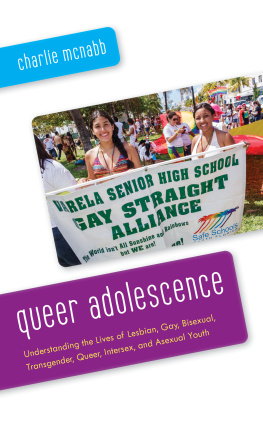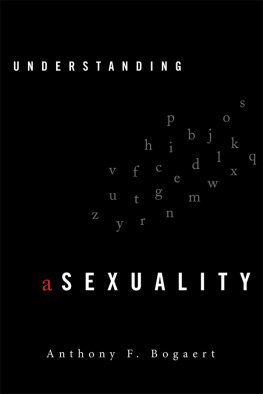What Do You Mean You're Not Interested In Sex?
American Life and Law from an Asexual Perspective
By Amanda C. Lee
Copyright 2013 Amanda C. Lee
Smashwords Edition
Smashwords Edition, License Notes
Thank you for downloading this free ebook. You arewelcome to share it with your
friends. This book may be reproduced, copied anddistributed for non-commercial
purposes, provided the book remains in its completeoriginal form. If you enjoyed this
book, please return to Smashwords.com to discoverother works by this author. Thank
you for your support.
Table of Contents
Lack of visibility makes it hard for acommunity to form. It was not until the advent of the internet, andits allowance for anonymity, that we began to see the developmentof an asexual identity and culture. The first asexual forum andeducation site was founded in 2001, making it barely a decade old.It was not always easy to find either, as initially searches forthe term 'asexual' were more likely to bring an individual towebsites about plant and single-cell organisms than humansexuality. In so many ways the asexual identity is new and fragile,and the fight for acceptance is just beginning.
If you are a member of a very, very smallminority it can be even more difficult to be different. You are farless likely to see anyone like you represented in the media. Moreimportantly those around you are far more likely to be dismissiveof your differences, or downright hostile to them, because theyhave not seen anyone like you represented in the media either. Soclearly there is something wrong with you. When people think thereis something wrong with you, they often feel they have the right,sometimes even the obligation, to help you correct that "wrong"regardless of whether you see it as a problem or not.
I have never been what one could callconventional for a whole host of reasons. I was different in somany ways that trying to label and understand all my differenceswas challenging. By the time I started high school I had alreadyinternalized and accepted terms like "freak," and "weirdo." I didnot start parsing out all the things that made me so alien to mypeers until college. But one of the most noticeable differencesbecame apparent during junior high and high school. My "crushes"were largely superficial. I picked those who I thought were prettyor nice, but whom I was certain would not return any advances. Iwas lonely, but for friendships more than romances. There weretimes I longed for a relationship more emotionally intimate thanfriendship, for someone to cuddle with and hold hands with, but mythoughts never went beyond snuggling. Puberty came and went andsexual interest never appeared. I faked sexual interest becausethat is what I thought I was supposed to do.
I was not very good at faking interestthough, not in those earlier years, and probably not later. Nearlytwo decades later and I still recall a comment from some girls mysophomore year of high school. They were chatting about boyfriendsand sexual relationships and I made a comment. I no longer recallmy own comment, only the reaction which was dismissive and harsh intone, "We just always assumed you were asexual, you know, like aplant."
"Youcan't be asexual, you're not a plant."
The origins of the word, its common scientificuse, and how its evolved
It can be particularly hard to definesomething by what it lacks, which is another of the challenges thatthose within the asexual community face. Language is fluid,constantly needing to adapt to a changing society and world.Communities often find themselves trying to adapt old words to newmeanings or creating new words for things that we could not findthe right words for. This can lead to confusion and frustration forthose who are on the outside of that community. Below are the keyterms most often used by those within the asexual community, theirdefinitions, and their slang equivalents.
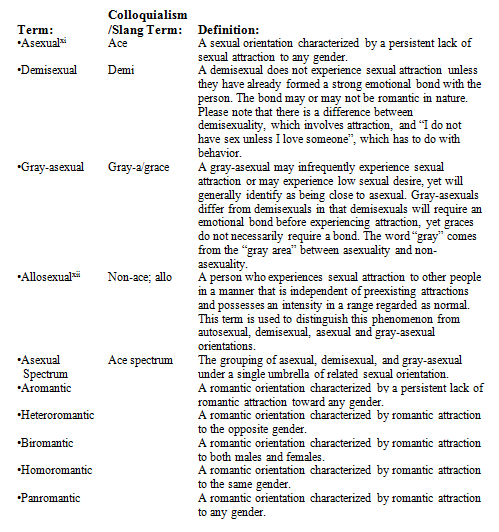
"Oh, so you're celibate? I didn't knowyou were religious."
Celibacy and abstinenceboth imply a sacrifice as one is preventing oneself from acting ona desire or impulse. Asexuality, like other orientations, is not achoice. Aces do not feel sexual attraction to others, and there isno sacrifice involved in not having a sexual relationship.Additionally desire and action are very different things. Peoplewill do things they may not desire to do for a variety of reasons.Someone may love chocolate but not eat it because of an allergy.Conversely someone may hate their job, but still go to work becausethey want to get paid.
Compromise is a largepart of relationships, and that is no different for asexualrelationships
I do not consider myself celibate despite thefact that I have not had a sexual relationship in more than adecade. For me celibacy describes a sacrifice, a hardship. The lastten years or so of my life has been anything but a hardship. I havenot missed sex, have not yearned for it nor bemoaned my lack. Icould have had sexual partners within that time, and at least onerelationship I pursued imploded because I was not interestedin sex. So it was not a case of me just accepting the status quoand learning to live with it. I have had to learn how to livewithout sugar and most carbohydrates for health reasons, and thathas been a sacrifice. I dream of those foods I am no longerallowed. I do not dream of sex. For me it would be like dreaming oflettuce, which I am neither crazy about nor disgusted by. Lettuceis just there. It is not something I think about without prompting,and even with prompting I will try to find something that doesactually interest me.
"Everyone wants sex. You are just notgetting any and want to feel special."
Being awareof our own metabolic chauvinism can help us empathize more withothers, because awareness of the issue allows us to acknowledge itseffect and attempt to move past it.
Metabolic chauvinism leadsthem to conclude that everyone must have the same levels ofdesire or attraction, or at the very least some levels of desire ofattraction. The idea that someone could not ever experience sexualdesire, or that they might experience sexual desire but notattractionthat desire is not aimed at anyone, just a physicalresponseis completely inconceivable to them. Just like many peoplehave trouble understanding why someone might not want or likechocolate, they cannot conceptualize not wanting sex. The responsesfor not wanting chocolate and not wanting sex are often similar."What do you mean you do not want "x?" Everyone loves "x." Have youeven tried it? Give it time, you'll come to like iteventually."
"You don't want to label yourself too soon. Youjust haven't met the right person yet."
Xs on the Kinsey Scale
Related to the "give it time" arguments arethe "it's just a phase" and "you haven't met the right person yet"arguments. Many in the queer spectrum will be familiar with thesearguments, as well as the "how can you know if you have not tried"argument because these are the same arguments that even today getused when someone comes out as gay, bi, lesbian, trans, queer,etc.. While it can be fun to turn these questions on their head aswell as challenge the questioning party on when they knew they wereheterosexual (or gay, bi, etc) it is not always as helpful as beingable to point out studies that show it is not just a phase, nor isit a complete anomaly as others experience the same thing in afairly steady percentage.
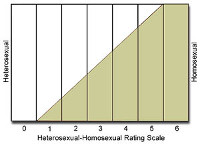
Next page
